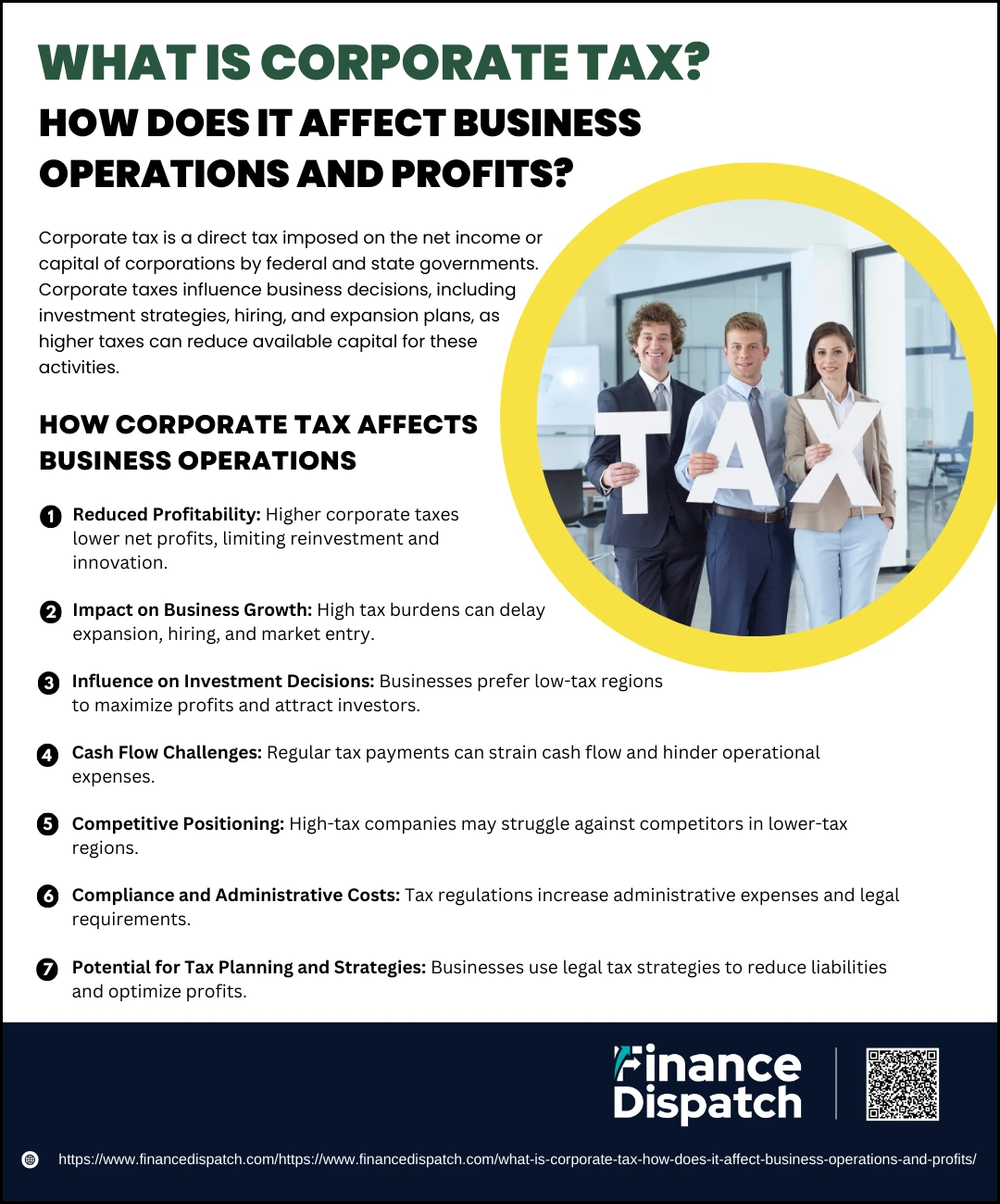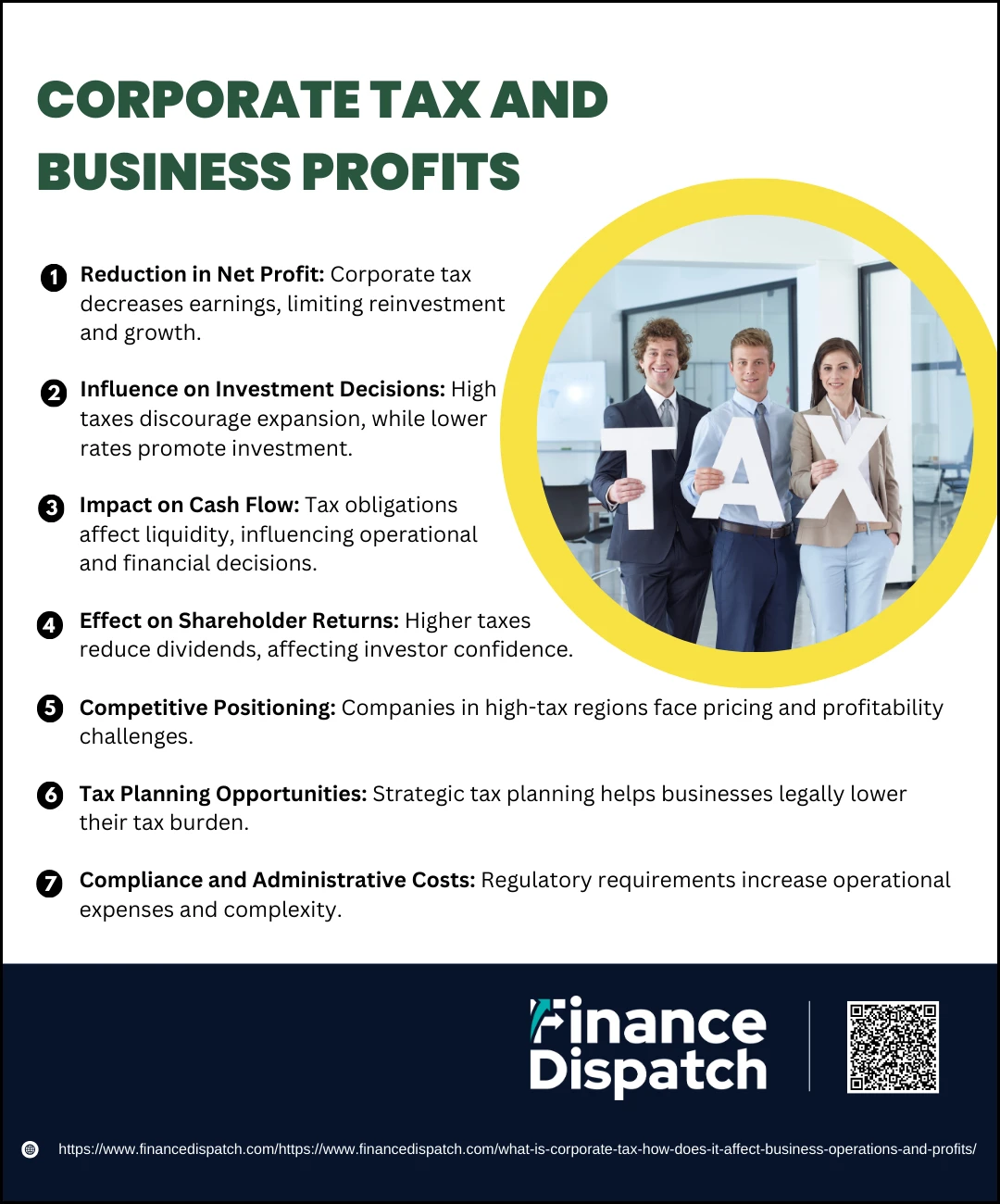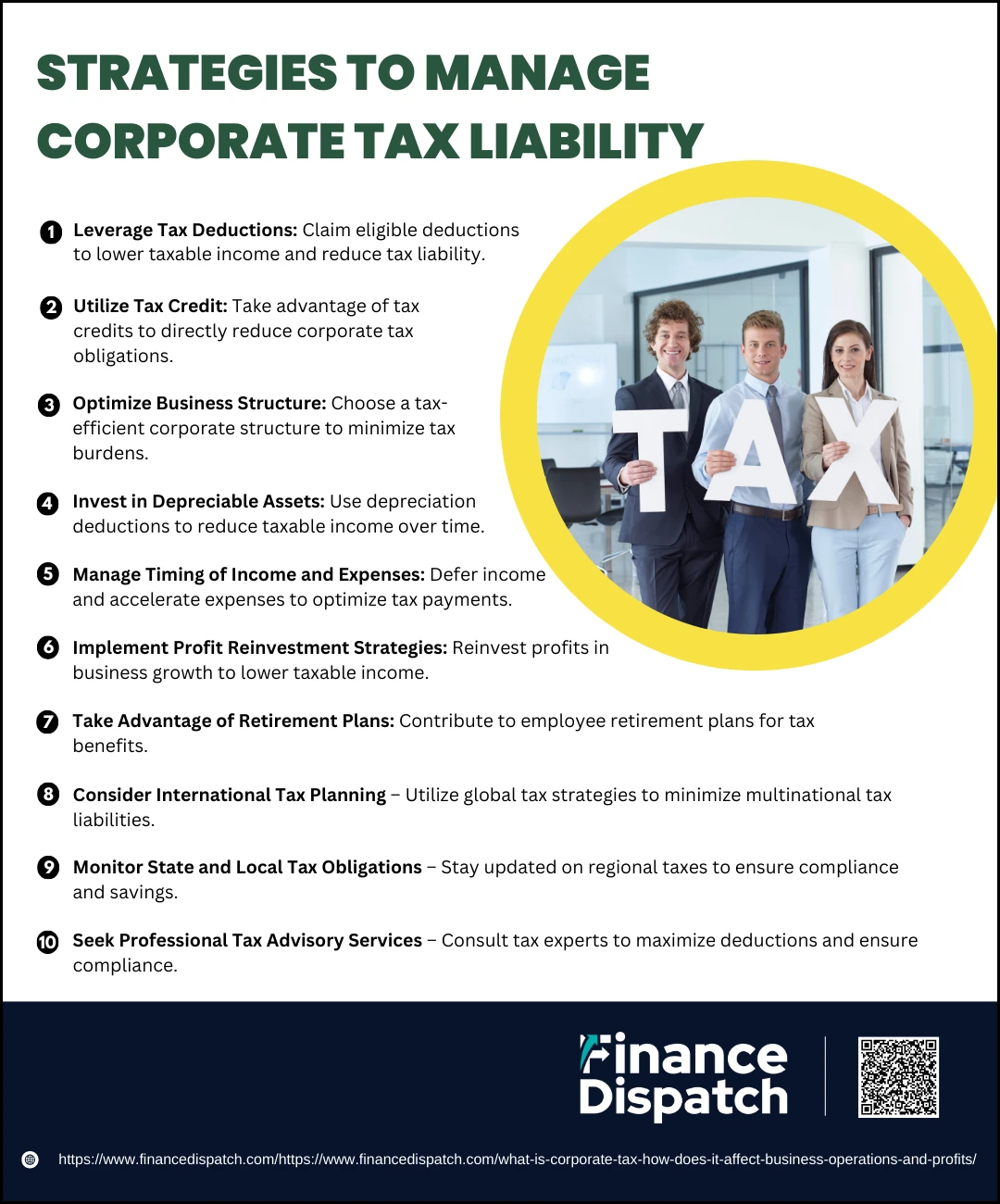Corporate tax is a fundamental aspect of business finance, directly influencing a company’s profitability, financial planning, and overall economic impact. It is a tax levied on a corporation’s net income, calculated after deducting expenses such as salaries, operational costs, and depreciation. Governments worldwide use corporate taxes as a significant revenue source, funding public services and infrastructure. However, the burden of corporate taxation can shape business decisions, affecting investment strategies, expansion plans, and even pricing models. Understanding corporate tax is essential for business owners and investors, as it not only determines a company’s tax liability but also impacts its ability to grow and compete in the market. In this article, we will explore what corporate tax is, how it is calculated, and the ways it influences business operations and profitability.
What is Corporate Tax?
Corporate tax is a direct tax imposed on the profits of businesses by governments. It applies to corporations and is calculated based on their net income, which is the revenue earned minus allowable business expenses, such as salaries, operational costs, and depreciation. The tax rate varies by country, with some nations offering lower rates to attract businesses, while others impose higher rates to generate government revenue. Corporate tax serves as a crucial source of funding for public services, infrastructure, and economic development. However, companies often seek to reduce their tax liabilities through deductions, exemptions, and strategic financial planning. Understanding corporate tax is essential for businesses, as it directly affects their financial health, investment decisions, and overall growth potential.
How is Corporate Tax Calculated?
Corporate tax is calculated based on a company’s taxable income, which is derived by subtracting allowable deductions and expenses from its total revenue. The applicable corporate tax rate is then applied to this taxable income to determine the final tax liability. Various deductions, exemptions, and credits can reduce the total amount a corporation owes. Below is a step-by-step breakdown of corporate tax calculation:
Corporate Tax Calculation Breakdown
| Step | Description |
| 1. Determine Total Revenue | Calculate all earnings generated from business activities. |
| 2. Subtract Deductible Expenses | Deduct business-related expenses such as salaries, rent, depreciation, and utilities. |
| 3. Compute Taxable Income | Revenue minus allowable deductions gives the taxable income. |
| 4. Apply Corporate Tax Rate | Multiply taxable income by the applicable corporate tax rate. |
| 5. Consider Tax Credits & Exemptions | Reduce tax liability through available tax credits or special exemptions. |
| 6. Determine Final Corporate Tax Liability | The final corporate tax payable after all deductions and credits. |
 How Corporate Tax Affects Business Operations
How Corporate Tax Affects Business Operations
Corporate tax is a major factor in a company’s financial strategy, directly impacting profitability, cash flow, and long-term growth. Businesses must allocate a portion of their earnings to corporate tax, which can influence decisions on expansion, pricing, and investment. High corporate tax rates can reduce net profits, limit reinvestment opportunities, and even deter foreign investors. On the other hand, tax incentives and deductions can encourage business growth and innovation. Understanding how corporate tax affects different aspects of operations helps companies make informed financial decisions. Below are some key ways corporate tax influences business operations:
1. Reduced Profitability
When businesses pay higher corporate taxes, they retain fewer profits. This can affect their ability to invest in new projects, distribute dividends to shareholders, or increase employee salaries. Lower profitability may also discourage entrepreneurship and innovation.
2. Impact on Business Growth
A company with a high tax burden may delay expansion plans due to a lack of reinvestable funds. This can limit the business’s ability to scale, hire new employees, or enter new markets, slowing down overall economic growth.
3. Influence on Investment Decisions
Corporate tax rates often determine where businesses choose to establish or expand operations. Many companies move to regions with lower tax rates to maximize profits and attract foreign investment. Countries with high corporate tax rates may struggle to retain businesses and investors.
4. Cash Flow Challenges
Corporate taxes must be paid on time, often in quarterly installments. If not managed properly, this obligation can create cash flow issues, affecting a company’s ability to cover operational expenses, debt repayments, or emergency costs.
5. Competitive Positioning
A company operating in a high-tax country may struggle to compete with businesses in lower-tax regions. This could lead to higher product prices, reduced market share, or decreased financial flexibility. Global corporations often engage in tax planning to remain competitive.
6. Compliance and Administrative Costs
Businesses must comply with corporate tax regulations, which require detailed financial reporting and tax filings. This increases administrative costs, as companies need accountants, tax advisors, and legal experts to ensure compliance.
7. Potential for Tax Planning and Strategies
Many companies implement strategic tax planning to minimize their tax burden legally. This includes reinvesting profits, utilizing deductions, taking advantage of tax credits, or restructuring business entities to optimize tax efficiency.
Corporate Tax Rates around the World
Corporate tax rates vary significantly across different countries, influencing where businesses choose to operate, invest, and expand. Some nations impose high corporate taxes to generate government revenue, while others maintain lower rates to attract foreign investment and boost economic activity. Countries known as tax havens, such as Ireland and the Cayman Islands, offer extremely low or zero corporate tax rates to encourage multinational corporations to establish headquarters there. Below is a comparison of corporate tax rates in key economies worldwide.
Corporate Tax Rates in Major Economies
| Country | Corporate Tax Rate | Special Considerations |
| United States | 21% | Some states impose additional corporate taxes. |
| United Kingdom | 25% | Companies with lower profits may qualify for reduced rates. |
| Germany | 29.8% | Includes federal and municipal corporate taxes. |
| France | 25% | Previously higher; reduced to attract investment. |
| Canada | 15% (Federal) | Provinces levy additional corporate taxes. |
| India | 22% | Lower rate of 15% applies to new manufacturing companies. |
| China | 25% | High-tech companies may qualify for reduced rates. |
| Japan | 23.2% | Local and national taxes combined. |
| UAE | 9% | Introduced corporate tax in 2023; previously tax-free. |
| Ireland | 12.5% | Popular tax haven for multinational corporations. |
| Switzerland | 14%-25% | Varies by canton; known for business-friendly tax policies. |
| Brazil | 34% | One of the highest corporate tax rates globally. |
| Australia | 30% | A lower rate of 25% applies to small businesses. |
 Corporate Tax and Business Profits
Corporate Tax and Business Profits
Corporate tax is a crucial factor in determining a company’s profitability, as it directly affects how much income remains after taxes are paid. Businesses are required to pay a percentage of their taxable income to the government, reducing the amount of profit available for reinvestment, expansion, or distribution to shareholders. While corporate tax ensures that businesses contribute to public infrastructure and economic development, high tax rates can also limit financial flexibility and hinder growth. Companies must balance tax obligations with strategic planning to minimize liabilities, optimize cash flow, and sustain profitability. Below are key ways corporate tax impacts business profits:
1. Reduction in Net Profit
Corporate tax takes a share of the company’s earnings, reducing net profit margins. A higher tax rate means businesses have less disposable income, which can limit reinvestment opportunities and expansion plans.
2. Influence on Investment Decisions
Companies often base investment decisions on tax implications. High corporate taxes can discourage businesses from expanding operations, investing in research and development, or entering new markets. Conversely, lower tax rates incentivize investment, driving economic growth.
3. Impact on Cash Flow
Regular corporate tax payments affect a business’s liquidity. Companies need to allocate funds for tax obligations, which can impact their ability to meet operational expenses, pay suppliers, or finance new projects. Poor tax planning can lead to cash flow shortages.
4. Effect on Shareholder Returns
For publicly traded companies, corporate tax affects the dividends distributed to shareholders. A higher tax burden means less profit is available for dividend payouts, potentially lowering investor confidence and affecting stock prices.
5. Competitive Positioning
Businesses operating in high-tax jurisdictions may face challenges competing with companies in lower-tax countries. This can impact pricing strategies, profit margins, and overall market competitiveness. Many multinational corporations seek tax-friendly environments to maximize earnings.
6. Tax Planning Opportunities
Strategic tax planning, such as utilizing deductions, credits, and tax incentives, can help businesses reduce their taxable income. Effective tax strategies enable companies to legally lower their tax burden, ensuring more profits are retained for growth and reinvestment.
7. Compliance and Administrative Costs
Filing corporate taxes involves regulatory compliance, legal requirements, and financial reporting. The costs associated with tax compliance—such as hiring accountants, legal advisors, and auditors—add to overall business expenses, impacting profitability.
Tax Deductions and Exemptions for Businesses
Tax deductions and exemptions are essential tools that help businesses reduce their taxable income, lowering overall tax liability. By taking advantage of allowable deductions, companies can maximize profits, reinvest in growth, and improve cash flow. Common deductible expenses include employee wages, operational costs, and business-related travel, while exemptions may apply to certain types of income or business structures. Understanding these tax-saving opportunities allows businesses to optimize financial planning and compliance. Below are key tax deductions and exemptions available to businesses:
1. Employee Salaries and Benefits
Businesses can deduct wages, salaries, bonuses, and commissions paid to employees, along with benefits such as health insurance, retirement contributions, and tuition reimbursements.
2. Rent and Utilities
Office rent, leasing costs, electricity, water, internet, and phone expenses are deductible as part of the company’s operational costs.
3. Business Travel and Meals
Companies can claim deductions on travel-related expenses, including airfare, accommodation, and meals, as long as they are directly related to business activities.
4. Equipment and Asset Depreciation
Businesses can deduct the cost of purchasing machinery, vehicles, office equipment, and technology over time through depreciation or accelerated tax write-offs.
5. Marketing and Advertising
Expenses related to branding, online marketing, social media advertising, and traditional advertising methods like billboards and television ads are fully deductible.
6. Professional Services
Fees paid to accountants, legal advisors, consultants, and tax professionals for business-related services can be deducted from taxable income.
7. Loan Interest Payments
Businesses can deduct interest paid on business loans, credit lines, and mortgages used to finance operations, expansion, or equipment purchases.
8. Business Insurance
Premiums for liability insurance, property insurance, workers’ compensation, and business interruption insurance are deductible business expenses.
9. Research and Development (R&D) Tax Credits
Companies investing in innovation, product development, or process improvements may qualify for tax credits or deductions under R&D incentive programs.
10. Charitable Donations
Contributions made to qualifying charities or nonprofit organizations can be deducted, encouraging corporate social responsibility while lowering tax liability.
11. State and Local Taxes
Certain business-related state and local taxes, such as property tax and sales tax, may be deductible at the federal level.
12. Start-up and Organizational Costs
New businesses can deduct expenses related to incorporation, licensing, and legal fees associated with launching a company.
 Strategies to Manage Corporate Tax Liability
Strategies to Manage Corporate Tax Liability
Corporate tax liability is one of the most significant financial obligations businesses face, directly affecting profitability and cash flow. Effective tax management ensures that a company meets its tax obligations while legally minimizing liabilities through strategic planning. By utilizing tax deductions, credits, and structuring finances efficiently, businesses can retain more capital for expansion, innovation, and operational growth. Proper tax planning also helps avoid penalties, enhances compliance, and allows companies to remain competitive in an evolving economic landscape. Below are key strategies businesses can implement to manage their corporate tax liability effectively:
1. Leverage Tax Deductions
Businesses should identify and claim all eligible deductions, including employee salaries, rent, utilities, travel expenses, and business supplies. These deductions lower taxable income, reducing the overall tax burden.
2. Utilize Tax Credits
Unlike deductions, tax credits provide a direct reduction in tax liability. Companies should explore credits for research and development (R&D), renewable energy investments, job creation, and employee training programs. These incentives not only reduce tax obligations but also promote business growth and innovation.
3. Optimize Business Structure
Choosing the right corporate structure, such as an S corporation, Limited Liability Company (LLC), or partnership, can provide tax advantages. For example, pass-through entities avoid double taxation by having profits taxed at the individual level instead of the corporate level.
4. Invest in Depreciable Assets
Businesses investing in machinery, equipment, office technology, and vehicles can claim depreciation expenses, reducing taxable income over time. Accelerated depreciation options, such as bonus depreciation and Section 179 deductions, allow businesses to deduct a larger portion of asset costs upfront.
5. Manage Timing of Income and Expenses
Strategic income deferral and expense acceleration can help businesses control taxable income. If a company expects lower revenue next year, it may defer income to the following year while accelerating deductible expenses in the current year to reduce tax liability.
6. Implement Profit Reinvestment Strategies
Reinvesting profits into business growth—such as expanding operations, upgrading technology, and hiring additional employees—can reduce taxable income while strengthening the company’s long-term financial stability.
7. Take Advantage of Retirement Plans
Contributing to retirement plans, such as 401(k) or pension plans for employees, helps businesses lower taxable income while providing long-term financial security for workers. Additionally, employer contributions to retirement plans are tax-deductible.
8. Consider International Tax Planning
For multinational businesses, structuring operations in tax-efficient jurisdictions and utilizing transfer pricing strategies can help reduce global tax liabilities. Understanding international tax treaties and compliance regulations ensures legal tax optimization while avoiding penalties.
9. Monitor State and Local Tax Obligations
State and local taxes, including sales tax, property tax, and franchise tax, can impact corporate tax liability. Businesses should stay updated on regional tax laws, take advantage of state-specific incentives, and ensure compliance to avoid fines and audits.
10. Seek Professional Tax Advisory Services
Navigating complex tax regulations requires expert knowledge. Hiring a tax consultant or accountant ensures businesses remain compliant, maximize deductions, and develop customized tax-saving strategies. Professional advisors also help identify opportunities for tax credits and exemptions that businesses might overlook.
The Future of Corporate Taxation
The landscape of corporate taxation is continuously evolving as governments seek to balance economic growth, revenue generation, and global competitiveness. With the rise of digital economies, international tax reforms, and shifting economic policies, businesses must prepare for significant changes in how corporate taxes are structured and applied. The global minimum tax initiative, led by the OECD, aims to prevent multinational corporations from shifting profits to low-tax jurisdictions, ensuring a fairer tax distribution across countries. Additionally, the growing push for environmental, social, and governance (ESG) policies may lead to tax incentives for businesses investing in sustainability, clean energy, and social responsibility. Digital services taxes (DSTs) are also becoming more common as governments seek to tax revenue generated from digital platforms operating across borders. Meanwhile, corporate tax rates may continue to fluctuate as countries compete to attract investment, leading to a mix of tax cuts, incentives, and stricter compliance regulations. The future of corporate taxation will require businesses to adopt flexible tax strategies, leverage technological advancements in tax compliance, and stay informed on emerging regulations to maintain financial efficiency and competitiveness in a rapidly changing tax environment.



